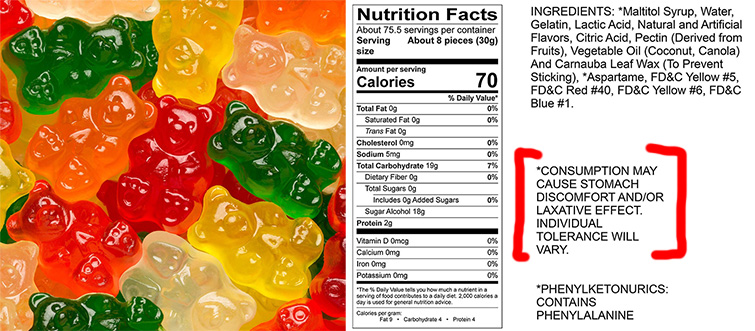Amazon’s sugar-free gummy bears have taken both candy lovers and health-conscious individuals on a rollercoaster ride of emotions. These treats — known for their enticing flavors and guilt-free appeal — have ignited both praise and backlash in equal measure. Whether you’re on a keto diet, managing diabetes, or simply trying to satisfy your sweet tooth without the sugar load, the sugar-free gummy bear phenomenon offers a fascinating case study. In this article, we will delve deep into the perplexities surrounding these sugar-free delights, their health implications, customer experiences, and expert insights, ensuring you stay informed about this controversial candy.

amazon sugar free gummy bears
A Brief Overview of Sugar-Free Gummy Bears
Sugar-free gummy bears, often made with maltitol or other sweeteners, aim to provide a sweet experience without the calorie count typically associated with traditional gummy candies. Many consumers are excited to find alternative candy options that don’t spike their blood sugar levels, especially those following low-carb diets or managing diabetes.
The Sweeteners Behind the Gummy Bears
At the core of sugar-free gummy bears are sugar substitutes such as maltitol. While these sweeteners can keep the glycemic index low, they come with a caveat. Health experts caution that excessive consumption can lead to digestive disturbances — a sentiment echoed in various consumer reviews. According to Dr. Sarah Johnson, a nutritionist from Harvard Medical School, “While sugar substitutes can help in moderation, it’s essential to listen to your body’s signals. For some, maltitol can be a double-edged sword.”
The Downfall: A Flood of Reviews
The reputation of these gummy bears took an unexpected turn with viral reviews across platforms like Amazon and Reddit. Many customers began sharing anecdotes about their unfortunate digestive escapades after indulging in the gummy bears. One customer noted, “It felt like my insides were performing a symphony of chaos.”
Humorous yet Cautionary Tales
Humor and horror intermingled in numerous online reviews, often detailing the ‘gummy bear cleanse’ that ensued. Public figures like Jim Gaffigan, known for his comedic takes on food, commented, “If you want to find out who your true friends are, just leave a bag of sugar-free gummy bears around.” The humorous warnings and tales of digestive distress spread rapidly, creating a rather unique cultural phenomenon surrounding sugar-free gummy bears.
The Health Perspective: A Double-Edged Sword
It’s crucial to assess sugar-free gummy bears from a health standpoint. While they can be suitable for those avoiding sugar, moderation remains crucial. Registered dietitian Emily Chan highlights, “The key takeaway here is that while sugar-free options can be enjoyed, they should be consumed in moderation. Otherwise, the consequences can be, quite literally, gut-wrenching.”
Are They Suitable for Diabetics?
The fundamental question surrounding sugar-free gummy bears is their suitability for individuals with diabetes. Studies show that while these gummies have a lower glycemic impact than their sugar-laden counterparts, portion control is essential. In fact, as noted by the American Diabetes Association, “Some sugar alternatives still contain carbs and can indirectly affect blood glucose levels.”
Consumer Experiences: Love Them or Hate Them?
Consumer opinions on Amazon sugar-free gummy bears showcase a diverse landscape of experiences. On one end of the spectrum, you have individuals praising their taste without the sugar-induced guilt. On the other hand, there’s a considerable cohort who experienced unintended consequences. The key seems to lie in individual tolerance levels to the sweeteners used.
The Taste Test
Many reviews praise the flavor profile of sugar-free gummy bears, often likening them to traditional gummy bears. A reviewer stated, “These tasted just like I remember gummy bears to be — a delightful burst of fruit flavors!” Others, however, mentioned the odd aftertaste linked to the artificial sweeteners.
Finding Balance: The Gummy Bear Conundrum
The ambivalence surrounding sugar-free gummy bears emphasizes the importance of balance in dietary choices. Whether appealing to those on a low-carb diet or individuals sidestepping sugar for health reasons, the pleasure of indulging should be counterbalanced by awareness of one’s digestive tolerance.
Expert Tips for Enjoying Gummy Bears
To maximize the enjoyment of sugar-free gummy bears, experts recommend the following tips:
- Start Small: If you are new to sugar-free gummies, begin by consuming a small amount to gauge your body’s reaction.
- Check the Ingredients: Not all sugar-free candies are created equal. Examine the ingredients for sweeteners that might be gentler on your stomach.
- Listen to Your Body: If digestive upset occurs, it might be best to steer clear or limit intake.
Wrapping Up: Are They Worth It?
Ultimately, the allure of Amazon sugar-free gummy bears lies in their promise of enjoyment without the sugar crash. However, with great power comes great responsibility. Educating oneself on the potential digestive impacts and balancing indulgence with moderation can lead to a more satisfying experience. As Dr. Johnson succinctly puts it, “Indulgence is okay; just respect your body.”
Frequently Asked Questions (FAQ)
Why did Haribo discontinue sugar-free gummy bears?
Due to overwhelming anecdotal evidence of adverse side effects, Haribo decided to stop selling their sugar-free gummy bears, focusing more on their traditional product lines.
Can diabetics eat sugar-free gummy bears?
While sugar-free gummy bears can be consumed by diabetics, moderation is key, as they still contain carbohydrates that can impact blood sugar levels.
What sweetener is in sugar-free Haribo gummy bears?
The primary sweetener used in sugar-free Haribo gummy bears is maltitol, which has been linked to various digestive issues when consumed in large amounts.
Are sugar-free gummy bears keto?
Some sugar-free gummy bears can fit into a keto diet due to their lower carbohydrate content, but it is important to read labels for any unhealthy ingredients that could contradict keto guidelines.